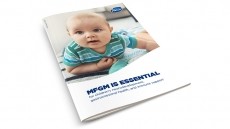Bio Serae targets joint health with milk proteins
milk proteins, which it says has produced good results at lowering
inflammation and cartilage degeneration.
The firm said the joint health market is a priority because of ageing populations with more disposable income.
Karen Jaunatre, spokesperson for BioSerae, told NutraIngredients.com that Osteol was the result of two years of research and development work.
The firm had a research budget of around €200,000 for the ingredient.
Jaunatre added: "For many years the populations of "developed" countries are ageing.
Older people now want to live longer, and better - that is, without suffering from age-related troubles, such as joint pain.
"At the same time, their purchasing power has never been so high, and they consequently do not hesitate to spend more and more money for their well-being.
As a consequence, joint health is a growing market, full of opportunities - innovation being the key for success."
One of the advantages of the ingredient is that it is derived from milk protein, unlike other popular supplement ingredients such as chondroitin which is extracted from animal cartilage, like shark.
In the past, shark cartilage used in joint health supplements has been the focus of potential salmonella contamination.
In August, the UK Food Standards Agency warned batches of shark cartilage capsules originating from the United States could contain the bacteria.
Chondroitin is usually sold in combination with glucosamine, and Bio Serae says Osteol can be added to these ingredients to boost joint pain relief.
According to the Nutrition Business Journal, US sales for chondroitin and glucosamine supplements were $810m (€132m) in 2005.
Backing Four studies have been carried out by the firm, and although they have not been published in a peer reviewed journal, have showed promising results.
The ingredient, available globally, is said to also boost the effect when added to a chondroitin and glucosamine mix.
An in vitro study carried out by the firm showed adding Osteol improved the protection of chondrocyte (cells found in cartilage) from 25 per cent to 95 per cent.
A second study on rats showed Osteol could also boost the anti-inflammatory effect of standard joint health formulations.
Osteol has also been shown by BioSerae to inhibit cartilage degeneration caused by MMP's (matrix metalloproteinases) which in turn reduces joint discomfort.
Launches of ingredients aimed at the joint health market in 2006 helped bolster sales and allow more money to be spent on research and development.
The firm targetted the weight management and joint health markets with CactiNea, Id-alG and Salto3 and accounts for financial year 2006-2007 show the small company based in Bram received net profits of € 560,000 and €6.7m sales.
Sales turnover has grown from 28 per cent since last year's €5.2m, and this success will allow the group to invest some 10 per cent of it on developing and expanded its position.
Running costs amounted to €5.9m.











